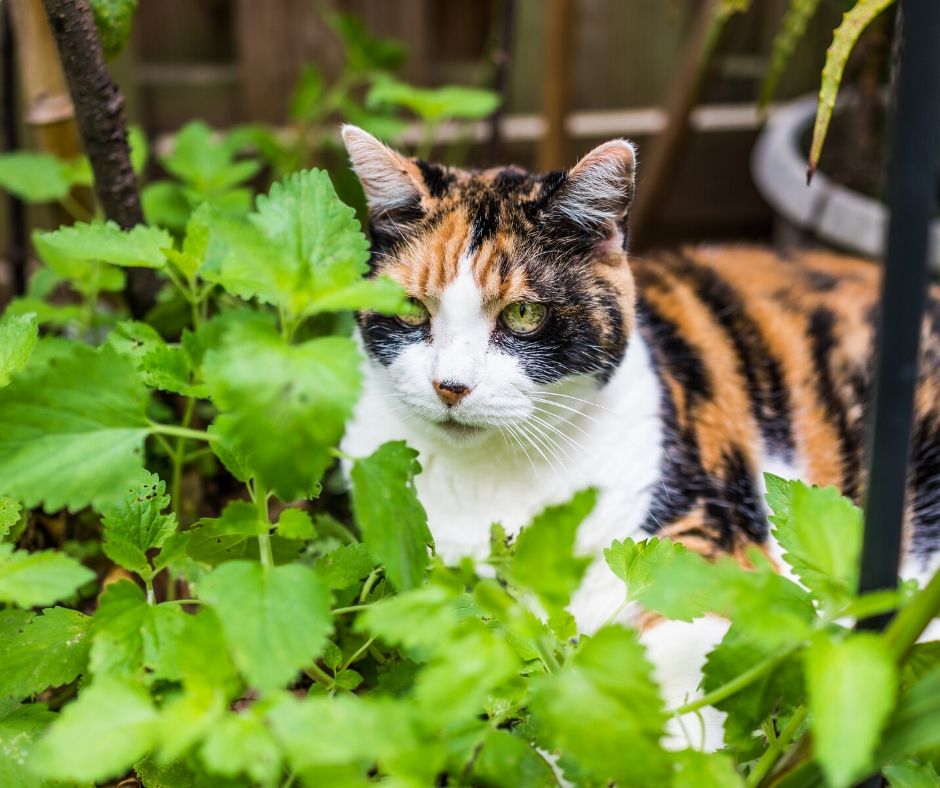If you dream about a green balcony, but you are afraid to fulfill this dream, because of fear for a furry, which can taste the contents of many pots, we’re coming with help. There’s a variety of herbs, that are safe for cats, which we can successfully grow at home, and eating them won’t have health consequences for our pet. Below is an overview of the most popular herbaceous plants, that eating doesn’t a threat to the cat.
Melissa
They say that nothing as good calm your nerves as an infusion of melissa. Cats probably also heard about it, because they willingly grab the fresh leaves of this medicinal perennial. The beneficial effects of melissa on cats are proven, and this knowledge is practically used by drug manufacturers and even … cat’s food. Preparations with the addition of this herb will be excellent for nervous and fearful individuals, helping them alleviate the symptoms of emotional distress (most likely because of a neighbor’s dog!).
Basil
Basil is also good in reducing cat’s stress, exactly like melissa. If we have a furry madman under the roof, a duo of melissa & basil will be a great idea to counteract cat’s insanity. It is worth getting a few bushes in case one of them is not enough. Thanks to this, there will also be something for us when we need something what’s better than two deep breaths, when we noticed the sofa is scratched…;)
Interesting fact: basil, in addition to its sedative effect, also has bactericidal and antiviral properties.
Catnip
This plant is a classic one and it’s hard to find a cat species that would resist its aroma (although there are exceptions to this rule!). Catnip consumption has a relaxing effect on the cat, and the feast with this plant in the lead role can end up with a truly euphoric mood (which is contagious – if you can watch of videos with crazy cats on Instagram or Youtube by hours, you know what we mean;)). While you can get addicted to watching cats, this rule does not apply to catnip – nevertheless, it is better to dose this aromatic pastime to your furry, to make sure he doesn’t become immune to it.
Does your cat already have our kicker with catnip and valerian?
Valerian
There’s no cat’s herbarium without this plant! This catnip alternative is equally popular among furries. The key to success with this plant is its smell, which works like a pheromone on a cat. It doesn’t mean the cat will confess its love to valerian, but it’s certain, that if he can’t resist it (we know that some cats are completely resistant to it), we can make popcorn and get ready to watch a short spectacle, calls “Cat on valerian’s high”.
P. S. And if you record it, there’s also a chance for a little bit of fame on Instagram;)
What else can catnip and valerian be useful for?
Check here:
Sage
It’s good to have this plant on the balcony or in the garden, because in addition to strengthening cat’s immunity, helping to fight allergies and bactericidal activity, it also repels insects, arachnids and ticks that can attack our furry. And there’s probably nothing worse than finding an intruder in your pet’s fur, while relaxing on the sofa in the evening (unless it’s a horror night!).
Coriander
If you see a cat biting a bunch of coriander, no worries – you don’t have to throw everything and take your pet to gastric lavage. The truth is, this is another proposition for furries with excess energy. Eating this plant has a calming effect on cats, but also a diuretic effect, so when you see a cat storming the window sill, it’s better to make sure that the litter box is also ready to repel the attack.
Dill
Dill is another treat for furry (that’s why you should carefully watch your bowl with cucumber salad – the competition is just waiting for you to turn around!). Eating dill will have a beneficial effect on the cat’s digestive processes, but beware! It can also stimulate his appetite! So we weren’t really joking warning you …;)
Rosemary
This plant is a real vitamin bomb for a cat and a powerful antioxidant, helping to maintain excellent health and slow down aging. It’s therefore worth including rosemary to the cat’s herbarium, but remembering that this delicacy should be avoided by young specimens and future cat mother (according to the principle “enough is enough!”).
Parsley
Green parsley isn’t only edible for cats, but you can also treat it as a kind of remedy for an animal that has urinary tract diseases. Parsley, in addition to being diuretic on furry, strengthens immunity and has antioxidant properties (forever young cat, can you ask for more?). 🙂
P.S. We advise you – that day, when there’s broth for dinner, the parsley will definitely lose to the chicken, so it’s better to have eyes peeled!
Thyme
Elastic skin and shiny fur? There’s a way for it – thyme bush! The cat gnawing this plant knows what it’s doing – thyme is a natural cosmetic, as well as a medicinal preparation – has, inter alia, an antiparasitic effect. There’s more benefits – eating this plant’s leaves has similar effect to catnip, so you know what to do when it ends and the cat looks at you reproachfully.
Although cats are strict carnivores, as you can see they won’t despise greens. It’s not only about taste – eating herbs helps them to digest and cleanse the intestines from the fur accumulated in them (for example, that is why a cat chewing a grass is such a common sight). Remembering what is safe for a cat (we recommend that you always have our cat’s herbarium at hand) you can easily reconcile plant growing with ensuring your pet’s safety, and choosing herbs in accordance with their health-promoting properties, you will include natural snacks in your cat’s diet, helping to maintain perfect health condition.





I have Italian parsley, is this ok for my cats to nibble? Thank you